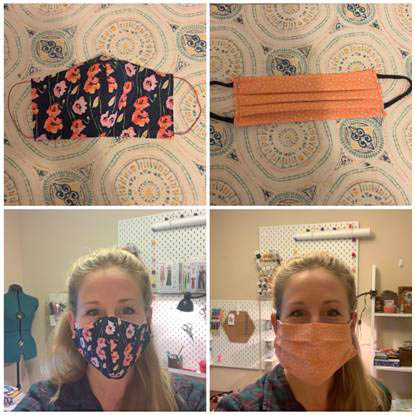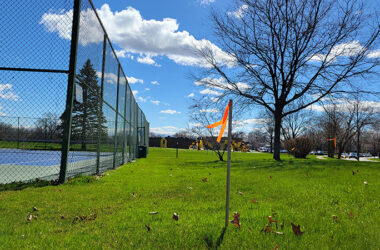Today we are living in a strange new world as we deal with the coronavirus pandemic, and consequently, we are facing many unimaginable scenarios of shortages of food, normal household products and closed restaurants and bars.
And now, a new shortage is facing us: the need for face masks.
As government agencies are instructing everyone to wear a face mask to prevent the spreading of the COVID-19 virus, there is a growing need for the item, which is not normally found in large numbers in grocery stores, drug stores or other retail stores.
But, thankfully, the Homewood-Flossmoor community is blessed with the presence of a large number of “sewing angels” stepping up to meet the need because they want to help and make a difference in the fight to save lives.
Among those working to supply face masks in the area are: Sydney Nielsen, Khayla Roberts of Flossmoor, Diane Matthews of Flossmoor and Jeanelle Hampton of Chicago Heights.
They all say they will continue making masks as long as they are needed.
When Roberts heard there was a request from Silver Cross Hospital for donations of face masks for their health care workers, she didn’t hesitate. She started sewing immediately.
In about two weeks, she completed more than 200 masks. Originally, masks went to Silver Cross, but other hospitals were also included. Her workload has expanded to requests from businesses as well as neighbors, friends and community residents.
She makes the masks, packages them with the help of her mother, Ebony, and coordinates a safe way for pick-up. She said that at first it took her 10 minutes to cut, pin and sew one mask, until she began cutting all the fabric into various sizes.
“That saved me a lot of time,” she said. “I use cotton fabric, which can be easily hand-washed or machine-washed. I’ve also included a protecting filter which is also washable. I try to find patterns that will be fun for the Spring season and bring a happy feeling with everything that is going on.”
Roberts does not charge for the masks.
“I do accept donations to be able to continue making them. I enjoy making these masks for my community. I want to make sure everyone is safe, because a lot of our community are considered essential workers and still have families to go back home to. I also know there are a lot of elderly here who need the masks. Making these masks is not to gain in a monetary way. I know how to sew and I have the time, so why not give back to an amazing community?” she said.
Diane Matthews was inspired to begin making masks when a friend of hers, who is a nurse, asked her to help make the ties for masks she was working on.
“When I saw that medical professionals supported the use of masks and needed them, I knew I wanted to make more masks to help the community,” she said.
Matthews has a small business, “Made Sew Happy” (https://madesewhappy), where she creates fabric goods such as pillows, tote bags and pennant banners.
”But I have switched most of my sewing efforts to mask making at this time,” she said. “Initially I hesitated to start this effort because there were conflicting opinions and debates as to the usefulness of masks and the correct way to use them. But I’ve come to realize now that the masks I make provide some minimal protection and help to minimize the spread. It is not a perfect solution, but I hope it provides even a small level of help.
“I know the COVID-19 virus has left many feeling scared and helpless. But we have to have faith that we will persevere and weather this storm,” she said. “One tactic is to find a way to help. It does not have to be a grand gesture. A simple call to check on friends and family will go a long way.
“I have been fortunate enough to have materials on hand to make cotton masks and I am grateful for the opportunity to use my skills to help the community. I do not charge for the masks I make. Any donation goes to the cost of the materials used.”
She has donated masks to Sunrise Assisted Living in Flossmoor and Ludeman Development Center in Park Forest, local hospital staff, friends and neighbors.
“My motivation to keep this effort going is my gratitude to the medical professionals, first responders, delivery people and other essential workers who bravely go to work every day to keep the rest of us safe, healthy and fed,” Matthews said.
Sydney Nielsen, who lives in Chicago but is from Homewood, was inspired to begin making face masks when her mother, who is a nurse, asked her to make a few masks for her and her fellow nurses.
“She wanted to give them the masks to keep them from touching their faces. I posted a few pictures of the masks on my Instagram and it all grew from there,” she said.
Nielsen said she is fortunate to still have her full-time job and is able to work from home, but her hobby is sewing.
“I started making clothes about a year ago and I have never looked back!”
She started making traditional masks which can be churned out in 10 or 15 minutes, but she has switched to fitted masks which can take as long as 25 minutes. She uses available cotton fabrics ranging from quilting cotton, to bed sheets and button-down shirts.
“I have made more than 100 masks to date, and given that I work full-time, I think that is a pretty good number,” she said.
As for distributing the masks, Nielsen said her first priority is to get masks into the hands of essential workers.
“So far, I’ve shipped masks to nurses and aids, grocery store workers, homeless shelters and friends and family. There is no charge, but I accept donations which go towards material for the masks, fabric, elastic, thread, etc., as well as shipping material and postage. Any money left over will be split between a few homeless shelters I have been working with.”
She offers helpful advice about masks: wash them after each time you wear them outside; having 2 or 3 on rotation is a good idea; the main benefits are that you will touch your face less, and if you have the virus, the masks will help you lessen the spread.
Jeanelle Hampton has a full-time job but is also a busy seamstress with her part-time business known as Nellie Jean’s Classic Wraps. She had not initially planned to enter the mask making field, but it came about because of her father. He came to visit her briefly before the government notice urged everyone to wear a face mask.
When he arrived and saw her wearing not only a self-made mask, but also a protective bonnet and kimono, he asked her why she wasn’t making masks for everyone. She posted a photo of her outfit on her Facebook page, joking about how her father had admonished her. And, that was the beginning of her involvement.
“I was inundated with requests for masks; it was like a domino effect. My first batch was for my co-workers but when I learned of the shortage of protective gear for hospital workers and the governor encouraging everyone to wear a mask, I knew what I had to do,” she said.
Since she is working from home for her full-time job she immediately juggled her schedule to begin sewing. She started at full-speed, working 13 hours straight some days. In her first week she made nearly 300 masks.
“People needed them and I had to get them done,” she said.
“People sometimes are ordering from five to 20 masks and I don’t want to turn anyone away, but my first priority is always our first responders, medical workers and other essential workers. I always have a handful of masks when I go into a grocery store in case the employees have not received protective gear.”
Hampton added that fortunately she is a fabric hoarder so she has many fabric scraps to choose from for the masks, but one needed item is elastic and there is a real shortage of it and it may not be available until May.
“Thankfully, one of my clients donated a large spool to me which has been a great help,” Hampton said. “In these difficult times we have to give back and I want to help where I can,”



